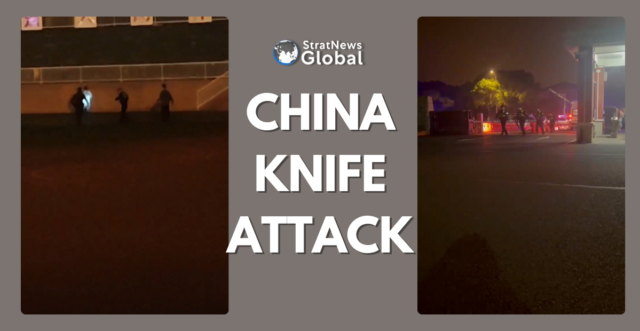The stabbing attack at the Wuxi Vocational College of Arts and Technology in eastern China on Saturday, in which eight people were killed at least 17 injured, has reignited conversations about mental health and societal pressures in China. The 21-year-old suspect, who was arrested at the scene, confessed to the crime.
The police said the suspect’s rampage stemmed from personal setbacks. Preliminary investigations found that he had failed an exam, did not receive his graduation certificate, and was dissatisfied with his internship compensation. The Yixing Public Security Bureau confirmed this as the trigger for his violent outburst.
At the college, witnesses described a sombre atmosphere. Students were seen leaving the campus with luggage, while some classes continued as scheduled. Duan, a mourner who laid flowers at the school gate, expressed sorrow for the young victims, stating, “They were just 18, 19-year-old kids. It’s such a pity and so sad.” Security personnel swiftly removed his bouquet.
Broader Context of Societal Strains
This stabbing follows a string of high-profile knife attacks across China, with at least six similar incidents recorded this year. Many of these attacks, according to experts, share a troubling pattern of “indiscriminate revenge against society.” Disadvantaged individuals, often with mental health challenges, resort to violence after perceiving themselves as victims of injustice.
In a separate but equally devastating event, a man drove his car into a crowd outside a Zhuhai sports stadium earlier in the week. The attack killed 35 people and injured 43. Police stated that the 62-year-old suspect was enraged over the terms of his divorce settlement. Both cases highlight the growing economic and social pressures in China, as its once-booming economy slows.
Qu Weiguo, a professor at Fudan University, called for systemic changes to prevent such tragedies. He emphasised the need for a robust social safety net, mental health support, and public oversight mechanisms to address grievances. However, discussions like these often face censorship, as was the case with Qu’s comments, which were removed from social media shortly after being posted.
Mental Health, Education, and Economic Pressures
The vocational college involved in Saturday’s attack is part of China’s efforts to prepare youth for specific industries amid rising unemployment. Courses offered include training in fields like marketing, interior design, and manufacturing. These institutions aim to divert students from oversubscribed universities, but dissatisfaction with job prospects remains a significant challenge.
In recent years, many young Chinese have voiced despair over limited opportunities and financial instability. Trending terms like “the garbage time of history” reflect a deepening sense of pessimism among the youth. The government has responded by introducing stimulus measures to revive the economy. Following the Zhuhai attack, President Xi Jinping instructed police to enhance their monitoring of individuals at risk of violent behaviour.
The latest incidents underscore the urgent need for mental health resources, economic reforms, and avenues for individuals to voice grievances without resorting to violence.
With inputs from Reuters
Research Associate at StratNewsGlobal, A keen observer of #China and Foreign Affairs. Writer, Weibo Trends, Analyst.
Twitter: @resham_sng





